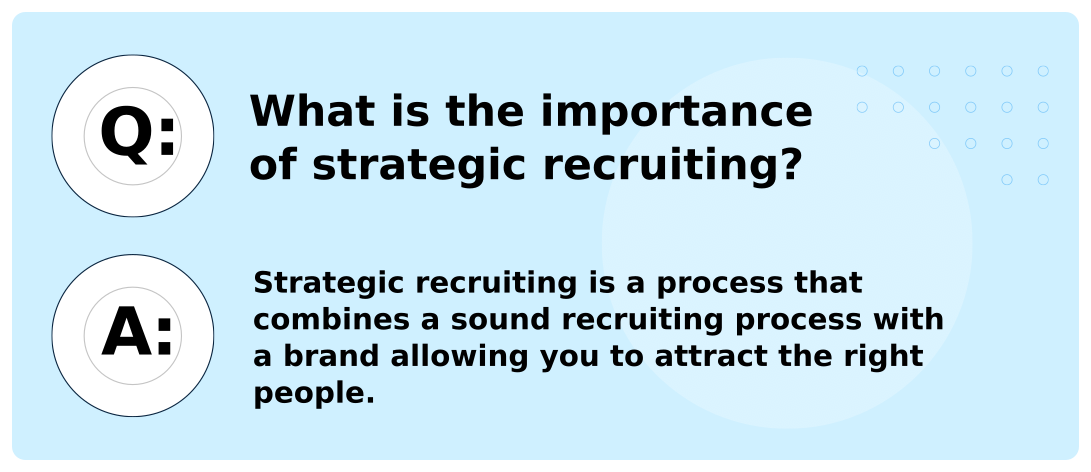
Recruiting is a necessary part of almost every organization from local bowling teams to Fortune 500 companies. For small business owners, recruiting and staffing often feels like a necessary evil. It consumes time and money, sometimes with little to show for it. Moreover, the process is often managed by the c-suite because small businesses do not need or cannot afford a full-time recruitment manager. In the end, the business struggles to find the right talent, or the talent comes at too high of a cost. This recurring problem leaves small business owners frustrated and can hamper growth. So what is strategic recruiting and how can it benefit small businesses?
Strategic Recruiting
Strategic recruiting is a holistic approach to acquiring talent. The main aim of a strategic recruiting process is to select talent tailored for your company. Strategic recruitment marries the positional needs of your company with brand marketing. This process ensures the company can both attract and select the right talent. All in all, strategic recruiting is effective recruiting.

What is the importance of strategic recruiting?
Strategic recruiting is the most important for small business owners. Strategic recruiting is a process that combines a sound recruiting process with a brand allowing you to attract the right people. In a small business, new talent has a great impact on culture and business function. It is essential your recruiting strategy pushes your business forward.
3 Stages of the Strategic Recruitment Process
- Attraction- Attraction is driving interest and traffic to a job posting. The attraction stage begins with understanding your company and the role it needs to be filled. To take a strategic approach to recruit, time should be spent detailing the desired skills, salary, competencies, and cultural fit in your organization. Then, companies should simplify their job descriptions with keywords. This makes posting more easily searchable. Finally, it is also important to market your brand. Recruiting is employer marketing.
- Engagement– Engagement is connecting with the talent once they have found your website or job posting. Engagement includes watching videos, reading the website, reacting to social media posts, and more. Videos are a newer wave of engaging with potential candidates. They can be used in job postings or external media to give a candidate an inside glimpse of what it’s like working for your company.
- Conversion- Conversion incorporates the whole process from application to interviews to selection and beyond. Small businesses need to strategically build their recruitment process so that conversion is repeatable and scalable. Strategic recruiting brings a critical eye to the conversion process so that small businesses are set up to scale. This will allow their recruitment practices to grow with the business.
The strategic recruiting framework effects Each stage of the recruitment process.. Your recruiting process should be Intentional. Repeatable. Scalable. Strategic recruitment that embodies these values will attract the right talent into the company help the business grow.
Strategic Recruitment Decisions
The first recruiting decision a small business needs to make is who will be leading the recruiting function. Small businesses can handle it internally, either through employees or a recruiting manager. The other option is to outsource it to an agency or 3rd party HR company. Recruiting agencies can help attract candidates to apply and typically have a database to pull potential candidates from. Recruiting agencies charge a percentage of the base salary or can operate off of retainer. Outsourced HR companies typically won’t attract candidates for you, but can help to build the strategic recruiting process outlined above. Outsource HR usually charges an hourly rate or a consulting project fee. way Outsourcing is a popular choice as it allows small businesses can access expertise without paying full-time salaries and benefits.
In the attraction phase, companies must make decisions about their needs, where to post job postings and budget. In the conversion phase, companies need to make sure their brand is consistent across the board. Whether your company brand is about fun and collaboration or innovative and hardworking, these qualities should be reflected in anything externally facing. Building a values-first corporate brand in recruiting helps you attract talent that in turn represents your brand. Finally, small businesses need to be process driven about who and how to interview and hire. It is important to note that no hire is perfect. We recommend building a development plan post-interview to fill in the gaps between candidate and company needs.
Do you need help with strategic recruiting?
Contact our team at Milestone today for an example of how an outsourced HR company can build a strategic recruiting plan. We take the time to understand your business, stakeholder needs, and position requirements. We then build a strategic recruiting process to attract and retain the right talent for your business. Milestone is a small business built for small businesses.
Related Content

Startup Employee Benefits – Compensation and Health Benefits for Startup Companies
At its core, your startup or small business should include the following benefits: Health Insurance (vision and dental), paid time ...

How To Pay Employees in a Startup
At a fundamental level, HR management includes any tasks that help optimize your most valuable resource—your people!

What Are the 4 Fundamentals of HR?
At a fundamental level, HR management includes any tasks that help optimize your most valuable resource—your people!
Stay in the know